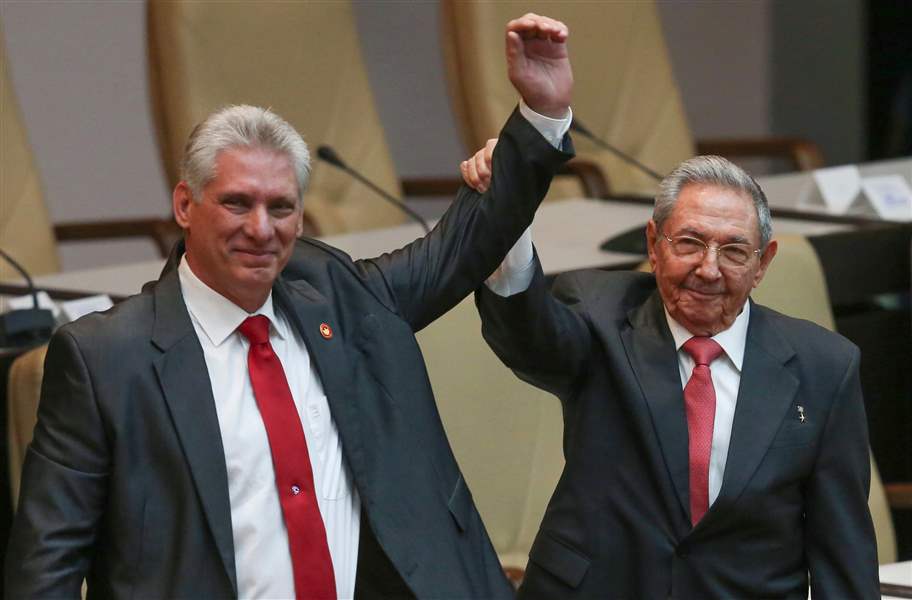
A new day in Havana
4/23/2018
Cuba’s outgoing President Raul Castro, top right, and new President Miguel Diaz-Canel raise their arms in unison at the National Assembly in Havana, Cuba.
ASSOCIATED PRESS
Cuba is set to begin a new era with its first post-revolution leader who is not a Castro. In fact, the newly elected President Miguel Díaz-Canel was not even born when Fidel Castro took power in 1959.
Fidel Castro was succeeded by his brother, Raul Castro, 87, who is stepping down in an orchestrated transition of power. He tapped the former first vice president as his successor.
Click here to view more Blade editorials | Check out the Behind The Editorial series
And even though not much is known about Mr. Díaz-Canel, the United States ought to look for opportunities to cultivate a relationship with him that can improve relations between the U.S. and Cuba.
Fidel Castro famously outlasted 10 U.S. presidential administrations, assassination attempts, trade embargoes, and sanctions from the United States. When he died in 2016, eight years after handing over power to his brother, relations between the countries were beginning to thaw thanks to President Barack Obama restoring some economic relations.
The Obama administration reasoned that frozen economic and diplomatic relations were not serving either country’s interests. Cuba had defied pressure to relent for decades. America was missing out on investment opportunities and needed to seek a better strategy for affecting change in communist Cuba.
President Donald Trump agreed with conservative critics of Mr. Obama’s move and rolled back the measures. Then came a bizarre string of mysterious concussion-like injuries to western-nation embassy personnel working in Cuba, which further strained relations.
Much of the promise created by Mr. Obama’s loosening of restrictions has not been fulfilled. Cuba’s economy continues to struggle, particularly since the economy of its one-time patron state Venezuela has all but collapsed.
Whether Mr. Díaz-Canel will be open to loosening the regime’s grip on Cuba’s economy or embracing a renewed thaw with the U.S. is unknown, but the Trump administration should take the opportunity of a new leader to try again.
Frozen relations have done nothing to loosen the communist grip on Cuba, but have contributed to suffering both there and in the United States, where relatives remain largely separated from loved ones on the island just 90 miles from Florida.
A new relationship with Cuba — one that emphasizes a conditional engagement that requires some reforms on Cuba’s part — could reduce diplomatic tension and improve both nations’ economies.
Normalized relations could even produce much-needed answers about the mystery conditions that have caused permanent hearing damage and other health issues for embassy staff.
It also may help bring home the remains of Toledoan William Morgan, who was executed by the Castro regime in Havana in 1961. Mr. Morgan went to Cuba in 1957 to join the revolutionary forces, but later turned against Fidel Castro and was killed. His widow, Olga Goodwin, along with U.S. Rep. Marcy Kaptur (D., Toledo) have worked for decades to secure the return of his body.
With relations at a low point for more than a year, there is little to be lost, but much to be gained by trying anew with Cuba’s new leader. Cautious overtures could yield a breakthrough that delivers diplomatic, humanitarian, and diplomatic gains.